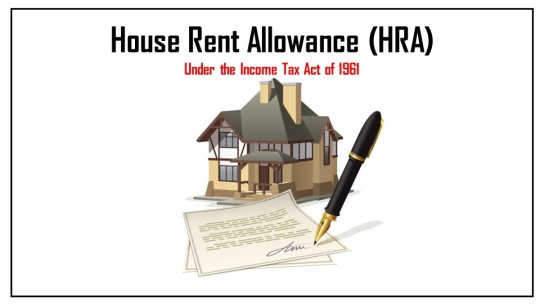#exemptions
Text

Insights on Tax Registration Exemption for Companies Operating in UAE
"Uncover tax registration exemptions for companies in the UAE. Stay informed on regulations to streamline your business operations."
0 notes
Text

Discover India's corporate tax landscape: varying rates for domestic and foreign companies, concessional options under Sections 115BAA and 115BAB, and crucial conditions for exemptions.
#taxation#corporate tax#domestic companies#foreign companies#Section 115BAA#Section 115BAB#exemptions#India
0 notes
Text
House Rent Allowance (HRA) under the Income Tax Act of 1961
House Rent Allowance (HRA) stands as a significant component of salary for many employees, offering tax benefits under the Income Tax Act of 1961. Yet, understanding the intricacies of HRA and its tax implications can often be perplexing. In this blog post, we delve into the fundamentals of HRA, providing clarity and insights to taxpayers.
Understanding House Rent Allowance (HRA):
What is HRA?…

View On WordPress
#documentary evidence#exemptions#finance#House Rent Allowance#HRA calculation#income tax#Income Tax Act 1961#investing#personal-finance#rental expenses#salaried individuals#salary package structure#self-employed#tax#Tax Benefits#tax implications#Tax Planning#tax savings
0 notes
Text
Benefits of O'Connor's Property Tax Protection Program
You never pay a nickel for anything unless we reduce your property taxes. Assist you with exemption questions and applications at no cost. Work with you to confirm the appraisal district is not overstating the size or condition or grade of your home. To learn more about the Texas property tax protection program with O'Connor visit:- https://www.poconnor.com/property-tax-protection-programs/
0 notes
Text
Top Tax Hacks for Capital Gains
Maximize your profits and minimize taxes! Dive into our infographic for top tax hacks for capital gains —expert advice, strategic insights, and more. Ready to make the most of your profits? Contact Allen Mayer for personalized guidance

1 note
·
View note
Text
Shell and BP Seek Help to Resolve LNG Trade Dispute, Boost Energy Cooperation
#BP #broadertraderelations #diversifyenergysources #energydemands #EuropeanUnion #exemptions #financiallosses #increasedcooperation #liquefiednaturalgasLNGexports #LNGimports #RoyalDutchShell #Russianenergyimports #tariffs #tensions #tradedispute #USLNGexports #USEUenergyrelationship #USEUTaskForceonEnergyandEnvironment
#Business#BP#broadertraderelations#diversifyenergysources#energydemands#EuropeanUnion#exemptions#financiallosses#increasedcooperation#liquefiednaturalgasLNGexports#LNGimports#RoyalDutchShell#Russianenergyimports#tariffs#tensions#tradedispute#USLNGexports#USEUenergyrelationship#USEUTaskForceonEnergyandEnvironment
0 notes
Text
NZ doctors avoided Covid jabs while insisting patients have them
NZ doctors avoided Covid jabs while insisting patients have them
View On WordPress
0 notes
Text


Desertduo fanon #1: "The Pose"
(my minecraft + mcyt tag)
#every 3rd life fans gotta draw them in 'the pose' and i am not exempt#3rd life#desertduo#desert duo#trafficblr#traffic smp#life series#grian#goodtimeswithscar#calocraft#fanart
6K notes
·
View notes
Text
Income Tax Slab for the Financial Year 2023-2024: A Comprehensive Guide

Income tax is a significant part of every citizen's financial responsibility, and understanding the income tax slab for the financial year 2023-2024 is crucial to manage your finances efficiently. In this blog, we will provide you with a comprehensive guide to the income tax slab for the upcoming financial year, helping you navigate your tax obligations effectively.
Income Tax Slab for Individuals Below 60 Years of Age
For individuals below the age of 60, the income tax slabs for the financial year 2023-2024 are as follows:
Income up to Rs. 2.5 lakhs: No tax payable.
Income between Rs. 2.5 lakhs and Rs. 5 lakhs: 5% of the income exceeding Rs. 2.5 lakhs.
Income between Rs. 5 lakhs and Rs. 10 lakhs: 20% of the income exceeding Rs. 5 lakhs, plus a cess of 4%.
Income above Rs. 10 lakhs: 30% of the income exceeding Rs. 10 lakhs, plus a cess of 4%.
Income Tax Slab for Individuals Aged 60 and Above (Senior Citizens).
For individuals aged 60 and above but below 80, the income tax slabs for the financial year 2023-2024 remain the same as for individuals below 60.
Income Tax Slab for Individuals Aged 80 and Above (Super Senior Citizens)
Super senior citizens, aged 80 and above, enjoy a higher exemption limit:
Income up to Rs. 5 lakhs: No tax payable.
Income between Rs. 5 lakhs and Rs. 10 lakhs: 20% of the income exceeding Rs. 5 lakhs, plus a cess of 4%.
Income above Rs. 10 lakhs: 30% of the income exceeding Rs. 10 lakhs, plus a cess of 4%.
Income Tax Rebates and Deductions.
The government provides certain rebates and deductions to help individuals save on their tax liability:
Standard Deduction: A standard deduction of Rs. 50,000 is available for salaried and pensioned individuals.
Section 80C: You can claim deductions up to Rs. 1.5 lakhs under Section 80C for investments in instruments like Employee Provident Fund (EPF), Public Provident Fund (PPF), and Life Insurance Premiums.
Section 80D: Deductions for health insurance premiums under Section 80D.
Section 24(b): Deductions for home loan interest up to Rs. 2 lakhs per annum.
Section 80E: Deductions for education loans.
Section 10(14): House Rent Allowance (HRA) exemption for salaried individuals.
For more information visit → https://commerceplanet.in/
#IncomeTax#TaxSlabs#TaxPlanning#FinancialYear#Deductions#Exemptions#SeniorCitizens#SuperSeniors#StandardDeduction#Section80C#Section80D#Section24b#Section80E#Cess#TaxBenefits#FinancialManagement#FY2023_24
1 note
·
View note
Text
company policy: sexual harassment bad
company when a customer sexually harasses you: i'm sorry but you have got to fuck that old man. for our values as a team❤️
#why are customers exempt from everything ...#atp a customer could stab me and i'd be told to apologize
5K notes
·
View notes
Text
#Underused Housing Tax#Exemptions#Smith and West CPA#Smith and West Chartered Professional Accountants
0 notes
Photo

i voted for reigen
#i hated coloring this but you have to understand how important the colors were to the comedy of it#wtnv#welcome to night vale#cecilsweep#cecil gershwin palmer#cecil palmer#comic#tumblr sexymen poll#tumblr sexyrematch#comics#digital art#personal comic#reigen arataka#bc hes not exempt from this#trans#transgender#sometimes a dispicable enemy can be a loving partner of 3 years#wtnv fanart#sorta???
14K notes
·
View notes
Text
Learn the tips and tricks of protesting and reducing your property taxes, as well as exemptions, appraisal districts. Free enrollment today; no flat fees. Visit:- https://www.poconnor.com/texas-property-tax-useful-information/
0 notes
Text
Tattoo girl masturbation
Tara Ashley rides hunk guys huge cock
Candid bbw white woman in tight jeans
This chastity device will stop you from jerking off permanently
Hot interracial amateur couple cum on belly
Eu dando aquela chupada e punhetando gostoso
Hairy granny tribbing cute teen
Bombshell brunette Gia Paige rubs her wet pussy
Gamer dude gets the best deep throat blowjob with hardcore cumshot
Bigtits brunette Crystal Rush anal fucked
#Naamana#ectiris#Nealey#beholds#Epirote#nonarticulately#exemptions#overaccelerating#cosmicality#chieftainries#nontribally#Diatoma#circumsphere#Jurdi#progressionism#Post-hittite#subchancel#Wellman#macabre#counterplay
0 notes
Link
Death by paper cut
#Ontario#education#health#medicine#COVID#vaccines#bureaucracy#schools#exclusion#suspensions#exemptions#bullying#Kafka#parents
0 notes
Text
National Security and Climate Change: Behind the U.S. Pursuit of Military Exemptions to the Kyoto Protocol [Part 9]
Continued from part 8
Some legislators, such as Benjamin A. Gilman and Pat A. Danner, wanted a “clear cut exemption of military emissions,” telling President Clinton they were concerned that emissions from domestic military training and operations of U.S. armed forces were not included [see Documents 19, 20]. Other critics spoke out as well. For example, the Committee to Preserve Security and Sovereignty (COMPASS), a group composed of analysts and former government officials like Dick Cheney, Lawrence Eagleburger, Jeane Kirkpatrick, Richard Burt, and Alexander Haig, supported then-Defense Secretary William S. Cohen, who had said that reductions in greenhouse gas emissions should not impinge on “national security.” COMPASS, seemingly affiliated with the George C. Marshall Institute, a conservative think tank central to a network of organizations denying climate change was caused by humans, claimed that the treaty would threaten “exercise of American military power.”[15]
This post is reprinted from the National Security Archive website and my History Hermann WordPress blog. Archived here and here.
State Department negotiators argued back that the agreement achieved the Pentagon’s aim of protecting military operations. They claimed that U.S. military emissions were low and pointed out that there was ample room within emission reduction commitments to accommodate U.S. military emissions [see Document 21]. The Department of State’s Bureau of Oceans and International Environmental and Scientific Affairs Office of Global Change further said that the department wanted specific and well-defined military operations to be excluded, such as those authorized by the United Nations, rather than more general operations [see Document 22].
Other documents in this posting note that the Pentagon was satisfied with the agreement, proposed that President Clinton announce opposition to emissions limits on domestic military operations and training, and argued that during the climate change negotiations U.S. goals included preserving “military protections” [see Documents 23, 24, 25]. The same year, the Pentagon was exempted from energy conservation and efficiency standards for military training, combat vehicles, and military support.[16]
© 2022-2023 Burkely Hermann. All rights reserved.
#defense department#bill clinton#pentagon#energy conservation#energy efficiency#1990s#kyoto protocol#exemptions#climate change
0 notes